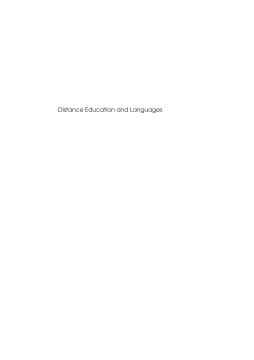
BOOK
Distance Education and Languages
Prof. Börje Holmberg | Dr. Monica Shelley | Dr. Cynthia J. White
(2005)
Additional Information
Book Details
Abstract
This edited book is the first collection of studies dealing specifically with the teaching of languages at a distance. It contains contributions from language teaching professionals working all over the world in different contexts and at different stages of development, and covers a variety of languages. Based on practical experience and research, it includes work on learner autonomy and support; theories of distance language learning; the development of intercultural competence; methodology and course design; different learning environments and how to make best use of them, and language teacher education. These contributions have been collected together in one volume to encourage the establishment of collaborative links between practitioners in different institutions and around the world and inspire more related research in the future to guide our understanding and reflection on evolution and change within the field.
Börje Holmberg is a linguist by training who leads the field in the development of theories relating to distance learning and teaching. He has held senior posts at Hermods in Sweden, the FernUniversität and the Private Distance-Teaching University of Applied Sciences in Germany. He holds honorary doctorates from universities in Australia and the UK. His many publications include Growth and Structure of Distance Education (1986) and Theory and Practice of Distance Education (1995).
Monica Shelley is a linguist who has worked at the Open University in the UK in Community Education, Modern Languages and Knowledge Resources Management. She has edited and published work in the field of foreign languages and distance education and her research interests focus on the language learning needs of distance learners, on the design and structure of language courses taught at a distance and the development of intercultural competence.
Cynthia White is Associate Professor in the School of Language Studies at Massey University in New Zealand, where she has worked in the field of distance education at the tertiary level for nearly 20 years. Her primary research areas are language learning in self-instruction contexts, learner autonomy and distance education. Her most recent publication is Language Learning in Distance Education (2003).
I found that Holmberg and his colleagues offer an excellent account of the practice of distance education, with particular emphasis paid to language. I found this book very useful and I was honoured to have been given the opportunity to review such excellent work. I feel that Holmberg and colleagues have written a fine compendium of distance education in relation to language teaching.
Rashid Aderinoye, University of Ibadan, Nigeria
Table of Contents
| Section Title | Page | Action | Price |
|---|---|---|---|
| Contents | 5 | ||
| Preface | 7 | ||
| Introduction | 9 | ||
| Chapter 1 Autonomy and the Distance Language Learner | 1 | ||
| Chapter 2 Critical Reflection and Autonomy: A Study of Distance Learners of French, German and Spanish | 20 | ||
| Chapter 3 Theoretical and Practical Issues in the Promotion of Collaborative Learner Autonomy in a Virtual Self-access Centre | 40 | ||
| Chapter 4 Towards a Learner-based Theory of Distance Language Learning: The Concept of the Learner–Context Interface | 55 | ||
| Chapter 5 Feedback in Distance Language Learning: Current Practices and New Directions | 72 | ||
| Chapter 6 A Framework for Supporting Students Studying English via a Mixed-mode Delivery System | 92 | ||
| Chapter 7 Assessing Intercultural Competence Gain in a German Distance Learning Course for Adults | 119 | ||
| Chapter 8 Developing Professional Intercultural Communicative Competence: Reflections on Distance Learning Programmes for Language Educators and Translators/ Interpreters in Bulgaria | 140 | ||
| Chapter 9 Teaching Foreign Language Skills by Distance Education Methods: Some Basic Considerations | 166 | ||
| Chapter 10 Course Design for the Distance Learner of Spanish: More Challenges than Meet the Eye | 178 | ||
| Chapter 11 Learner Autonomy and Course Management Software | 195 | ||
| Chapter 12 Chatlines for Beginners: Negotiating Conversation at a Distance | 212 | ||
| Chapter 13 Making Online Students Connect: Ethnographic Strategies for Developing Online Learning Experiences | 230 | ||
| Chapter 14 From Parrots to Puppet Masters: Fostering Creative and Authentic Language Use with Online Tools | 242 | ||
| Chapter 15 The Challenges of Implementing Online Tuition in Distance Language Courses: Task Design and Tutor Role | 258 | ||
| Chapter 16 Closing the Distance: Compensatory Strategies in Distance Language Education | 278 | ||
| Chapter 17 PLEASE (Primary Language Teacher Education: Autonomy and Self-Evaluation) | 295 | ||
| Chapter 18 Exploring Zones of Interactivity in Foreign Language and Bilingual Teacher Education | 309 | ||
| Notes on Contributors | 327 | ||
| Index | 333 |
